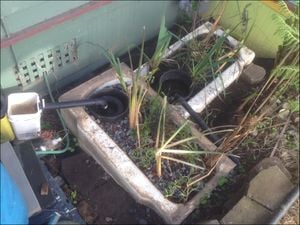Greywater

Greywater, grey water or gray water, is water that has been polluted with (non-)biodegradable soaps and detergents. It's all of the effluent water from a household, such as water discharged from lavatories (bathroom sinks), bathtubs, showers, clothes washers, sinks, laundry trays and floor drains that flows into effluent pipes throughout the house. It is not wastewater used for food preparation, or water closet (toilet) wastewater.
It carries nutrients and value but it also may also contain pathogens and/or harsh chemicals that care should be taken with it. However, it is not a great risk compared to blackwater (flush toilets, sewage).
Redirecting the water we use for tasks such as showering allows us to reclaim some of that value to grow plants and recharge the water table. It may be necessary to choose our soaps and detergents more carefully, if we use the greywater for watering and fertilizing plants.
Recycling[edit | edit source]
It is important to treat greywater separatly from blackwater, as the first is less polluted and so requires less treatment steps. By having less quantity of water going through less treatment steps the treatment procedure becomes more efficient and less costly.
It may be necessary to choose our soaps and detergents more carefully (opting for bio-degradable soaps/detergents), if we use the greywater for watering and fertilizing plants (see Water recycling systems without purification).
Systems[edit | edit source]
At present, several water recycling systems exist which can be used to:
- recycle the water without purifying it
- recycle the water while purifying or decontaminating it
Water recycling systems without purification[edit | edit source]
Water recycling without purification is used in certain agricultural companies (e.g., tree nurseries) and dwellings for applications where potable water is not required (e.g., garden and land irrigation, toilet flushing). It may also be used in dwellings when the greywater (e.g., from rainwater) is already fairly clean to begin with and/or has not been polluted with non-degradable chemicals such as non-natural soaps (thus using natural cleaning products instead).
This water system also needs a supply of water to recycle and reuses water as well. It is also not recommended to use water that has been in the greywater filtration system for more than 24 hours or bacteria builds up affecting the water that is being reused.
Water recycling with purification[edit | edit source]
Water purification/decontamination systems are used for applications where potable water is required (e.g., to allow drinking, and/or for other domestic tasks as washing, showering).
For filtering the water to become potable (or near-potable), there are numerous systems based on soft processes. These include natural biological principles such as
- mechanical systems (sand filtration, lava filter systems and systems based on UV radiation)
- biological systems (plant systems as treatment ponds, constructed wetlands[1], living walls) and Bio reactors or compact systems as activated sludge systems, biorotors, aerobic and anaerobic biofilters, submerged aerated filters, biorolls[2]
Finally, "hard", direct processes, such as distillation (evaporation) or mechanical processes such as membrane filtration, (typically ultrafiltration and reverse osmosis, which are capable of treating high volumes of grey water) can create potable, or near-potable water. There seem to be no commercially available "hard" greywater recovery devices suitable for on-site use in the individual household, even though a number of such technologies exist.
In order to purify the potable water adequately, several of these systems are usually combined to work as a whole. Combination of the systems is done in two to three stages, using a primary and a secondary purification. Sometimes a tertiary purification is also added.
Some municipal sewage systems recycle a certain amount of grey and blackwater using a high standard of treatment, providing reclaimed water for irrigation and other uses.
Advantages and disadvantages[edit | edit source]
Both the water itself as well as the nutrients inside the greywater is of value. This as water is an increasingly limited resource (especially in dry climates). Redirecting the pure water we use for tasks such as showering allows us to reclaim some of that value to grow plants and recharge the water table.
By using greywater systems to reuse drained wash water to flush toilets or to water lawns and gardens, we can halve the water use of most residential buildings.
Greywater systems may however require the purchase of a sump, greywater pressurization pump and secondary plumbing.
Suggested projects[edit | edit source]
- What is the effect of various detergents and soaps in a greywater system? Consider the receiving soil and plant types - the answer may vary.[expansion needed]
Related projects[edit | edit source]
Notes[edit | edit source]
- ↑ From the book "Guide to greywater": 1 of Constructed Wetland for every 1 gallon of graywater per day. This must be with a maximum two foot depth, especially considering that Oasis Design states 1/2 to 1 square foot for every 1 gallon of graywater per day
- ↑ Overview of biological systems with pictures
See also[edit | edit source]
- Earthship: domestic water system
- California greywater regulations and design
External links[edit | edit source]
- Water Conservation Alliance of Southern Arizona
- The old greywater system at CCAT
- Grey water recycling systems
- Knoxfield greywater system - application of greywater treatment in a house in Knoxfield, in the suburbs of Melbourne, Australia. - Greenlivingpedia
- The graywater guide book from January 1995 (pdf)
- Greywater.com - design information and diagrams.
- Oasis Designs, greywater information resource
- Common Grey Water Errors and Preferred Practices. "An ongoing effort to counter the tidal wave of grey water misinformation on the web." Oasis Designs (commercial site).
- Greywater for Trees and Landscape by Art Ludwig on agroforestry.net.
- Safe Use of Household Greywater, College of Agriculture and Home Economics New Mexico State University.
- Wikipedia:Greywater
- Grey Water forumsat Permies.com
- Gri Su Arıtma